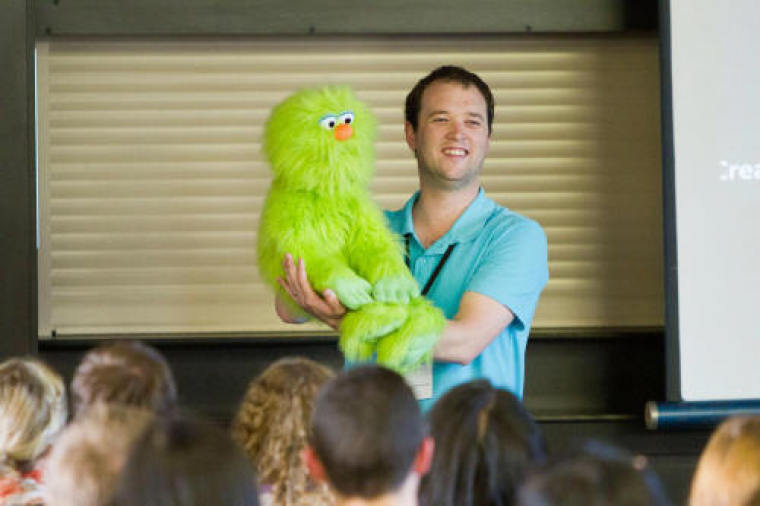

I have a great love for the classic children's talk spot in church. There is something enjoyable about teaching children the truth about God's word and his great plan of salvation for all people—in a fun, short way. At the same time, I am sure you can think of several children's talks that have not been done well, or were too simplistic, or focused just on getting the laughs.
This short article comes from the help of three current resources, each of which has a chapter on how to give a children's talk:
'Better be a Good Sermon' – Published by Simeon Association, 2011
'How to Prepare a Bible Talk' – Published by SMBC, 2003
'Children's Ministry on the Front Foot' – Published by Youthworks, 2013[i]
There are surprisingly few resources for this area of ministry, even though it is a standard part of many church services. Here are three tips to help craft better children's talks.
Do your own homework
There are many books out there telling you what to say for a children's talk. Just Google 'children's sermons' or 'children's talks' and you will find an abundance of '15 great talks for children', 'children talks—just add faith' or '12 engaging talks children will remember'.
These books and resources can be a great help, but they do not know the children in your congregation like you do. Don't take the easy road of little preparation. Do the hard work of going through the passage the children are learning from.
Try summarising the passage in a sentence—what is it about, what is happening? What is the key idea in this passage? What do you learn about God from this passage? What do you think the 'take home' idea is (most people call this idea the 'application')? Be careful not to make it simply 'do this' or 'do that'. We do not want to teach the bible as merely a list of moral behaviours.
What's your method?
Now that you have gone over the passage itself and tried to work out what it means, now it is time to start thinking of ideas on how to present it.
A classic mistake many people make while preparing a children's talk is thinking about the fun first. This is an easy temptation to fall to. Why? Because 'I just found out about a great science experiment that would work really well as a children's talk', or 'I just learned how to draw dinosaurs really quickly'.
Whatever your fun idea is, it can be very energising and that can sometimes be very distracting. When we do the bible work first, working out what the main idea is and what the main point is, then we can work out the best method of delivery.
It might very well be a science experiment to help explain a certain part of scripture, but when we know our main point before we know our method, our method serves our main point—not the other round.
When we choose our method before we do our bible work, we run the risk of making the bible fit with our 'super fun idea'—even when the passage has little or nothing to do with it. We run the further risk of people remembering the super fun idea/presentation more than the bible itself. We do not want to do this.
If you can't summarise your main point in a sentence, go back and look over the passage again before thinking about fun presentation ideas.
Know your audience
Children's talks always have a dual focus. This is because there are rarely only children in the room. There are usually teens and adults present. This can be distracting, but there are some important things to remember as we craft content.
Remember your primary audience. Children's talks are for children, though when they are done clearly, everyone will benefit. When you work hard on being clear and engaging, everyone is able to follow along.
Remember children's talks are short. It is a regular question: 'How long should a children's talk go for?' Someone once told me that a child's age in minutes is a good indication of length. Five minutes is a good average. I personally would go shorter than three minutes, and no longer than eight and a half minutes, by eight minutes you have had long enough for children.
Remember children are concrete thinkers. A great example is explained by Sandy Galea in 'How to Prepare a Bible Talk'. A child was asked 'have you given your heart to Jesus?' The child became upset and thought she had to go to hospital to have her physical heart removed. 'Why would Jesus want my heart?' This would normally be followed with 'Oh... right... I didn't mean your actual heart... um'.
Talk to children in concrete terms. So when describing ideas like faith, hope, love, peace, justice, being with Jesus, and all the many abstract terms we use in ministry; work hard to define them in ways children can understand. Work with your minister, a teacher friend, or a parent of a child in your church. You want to work with your minister so you don't oversimplify the terms, and you want to work with a teacher/parent so they can help you put the idea in ways that a child can understand.
Remember to know the children's world. When using an example to help describe something to explain something, make sure it is in a context that children understand. Talking to children about what it is like to work isn't helpful—as children don't tend to have jobs. For children in primary school, think about that world.
Consider their world when you chose your main point and application. In 'Better be a Good Sermon', Bruce Lenton talks about 'starting in the children's world, go to the bible, and return to the children's world.
Why not give one a try?
This is a short look into the world of children's talks. Why not give one a try? It will help your communication skills, presentation skills and usually they are a lot of fun to write and prepare. But at the end of the day, remember that preparation is key. The more you prepare, the better your presentation will be. Try to be more motivated by your preparation, rather than the chance to be up front in church.
Let's continue to think about how to effectively share the gospel with children, teenagers, and adults!
Stephen Urmston is based in Melbourne and is completing a Masters of Divinity at Ridley College. He is currently employed as an associate Children's and Family minister, and has been involved in children's ministry since 1999.
Stephen Urmston's previous articles may be viewed at http://www.pressserviceinternational.org/stephen-urmston.html
[i] Disclaimer: I have a chapter in this book, but this is not a promotional article. I receive no funds from the sales of the book itself.